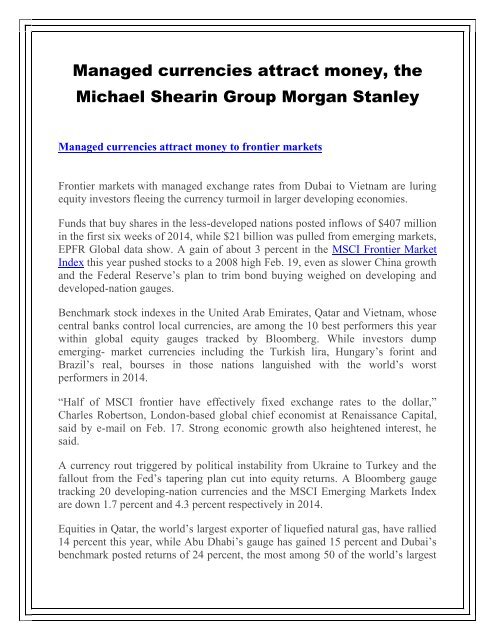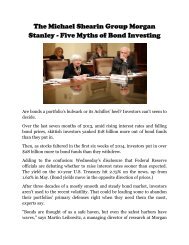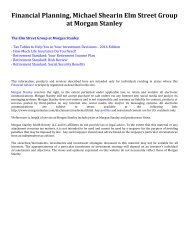Managed currencies attract money, the Michael Shearin Group Morgan Stanley
Managed currencies attract money to frontier markets Frontier markets with managed exchange rates from Dubai to Vietnam are luring equity investors fleeing the currency turmoil in larger developing economies. Funds that buy shares in the less-developed nations posted inflows of $407 million in the first six weeks of 2014, while $21 billion was pulled from emerging markets, EPFR Global data show. A gain of about 3 percent in the MSCI Frontier Market Index this year pushed stocks to a 2008 high Feb. 19, even as slower China growth and the Federal Reserve’s plan to trim bond buying weighed on developing and developed-nation gauges.
Managed currencies attract money to frontier markets
Frontier markets with managed exchange rates from Dubai to Vietnam are luring equity investors fleeing the currency turmoil in larger developing economies.
Funds that buy shares in the less-developed nations posted inflows of $407 million in the first six weeks of 2014, while $21 billion was pulled from emerging markets, EPFR Global data show. A gain of about 3 percent in the MSCI Frontier Market Index this year pushed stocks to a 2008 high Feb. 19, even as slower China growth and the Federal Reserve’s plan to trim bond buying weighed on developing and developed-nation gauges.
Create successful ePaper yourself
Turn your PDF publications into a flip-book with our unique Google optimized e-Paper software.
<strong>Managed</strong> <strong>currencies</strong> <strong>attract</strong> <strong>money</strong>, <strong>the</strong><br />
<strong>Michael</strong> <strong>Shearin</strong> <strong>Group</strong> <strong>Morgan</strong> <strong>Stanley</strong><br />
<strong>Managed</strong> <strong>currencies</strong> <strong>attract</strong> <strong>money</strong> to frontier markets<br />
Frontier markets with managed exchange rates from Dubai to Vietnam are luring<br />
equity investors fleeing <strong>the</strong> currency turmoil in larger developing economies.<br />
Funds that buy shares in <strong>the</strong> less-developed nations posted inflows of $407 million<br />
in <strong>the</strong> first six weeks of 2014, while $21 billion was pulled from emerging markets,<br />
EPFR Global data show. A gain of about 3 percent in <strong>the</strong> MSCI Frontier Market<br />
Index this year pushed stocks to a 2008 high Feb. 19, even as slower China growth<br />
and <strong>the</strong> Federal Reserve’s plan to trim bond buying weighed on developing and<br />
developed-nation gauges.<br />
Benchmark stock indexes in <strong>the</strong> United Arab Emirates, Qatar and Vietnam, whose<br />
central banks control local <strong>currencies</strong>, are among <strong>the</strong> 10 best performers this year<br />
within global equity gauges tracked by Bloomberg. While investors dump<br />
emerging- market <strong>currencies</strong> including <strong>the</strong> Turkish lira, Hungary’s forint and<br />
Brazil’s real, bourses in those nations languished with <strong>the</strong> world’s worst<br />
performers in 2014.<br />
“Half of MSCI frontier have effectively fixed exchange rates to <strong>the</strong> dollar,”<br />
Charles Robertson, London-based global chief economist at Renaissance Capital,<br />
said by e-mail on Feb. 17. Strong economic growth also heightened interest, he<br />
said.<br />
A currency rout triggered by political instability from Ukraine to Turkey and <strong>the</strong><br />
fallout from <strong>the</strong> Fed’s tapering plan cut into equity returns. A Bloomberg gauge<br />
tracking 20 developing-nation <strong>currencies</strong> and <strong>the</strong> MSCI Emerging Markets Index<br />
are down 1.7 percent and 4.3 percent respectively in 2014.<br />
Equities in Qatar, <strong>the</strong> world’s largest exporter of liquefied natural gas, have rallied<br />
14 percent this year, while Abu Dhabi’s gauge has gained 15 percent and Dubai’s<br />
benchmark posted returns of 24 percent, <strong>the</strong> most among 50 of <strong>the</strong> world’s largest
equity markets. The Persian Gulf countries keep <strong>the</strong>ir <strong>currencies</strong> pegged to <strong>the</strong><br />
dollar because earnings from energy exports are denominated in <strong>the</strong> U.S. currency.<br />
Shares in Dubai are benefiting from an economic recovery as <strong>the</strong> regional business<br />
hub gears up to host <strong>the</strong> World Expo in 2020 with $8 billion of infrastructure<br />
spending. The event, which traces its roots to London’s Great Exhibition of 1851,<br />
gave Paris its Eiffel Tower in 1889 and drew 73 million visitors to Shanghai in<br />
2010. Qatar’s government forecasts a current- account surplus of about 23 percent<br />
of gross domestic product this year and growth of 4.6 percent.<br />
Persian Gulf “markets enjoy a current account surplus and have never relied on<br />
global financing,” Rami Sidani, <strong>the</strong> Dubai- based head of Middle East and North<br />
Africa investments at Schroder Investment Management Ltd., said by e-mail on<br />
Feb. 18. “Their dollar-based economies mean that <strong>the</strong>y do not present any currency<br />
risk.”<br />
Fixed exchange rates have also helped spur a rally in Tunisian and Vietnamese<br />
shares this year, Sidani said.<br />
<strong>Managed</strong> exchange rates in countries with less financial prowess to defend <strong>the</strong>m<br />
have posed risks to <strong>the</strong> dollar- denominated returns of investors as countries from<br />
Argentina to Kazakhstan scale back support for <strong>the</strong>ir <strong>currencies</strong>.




